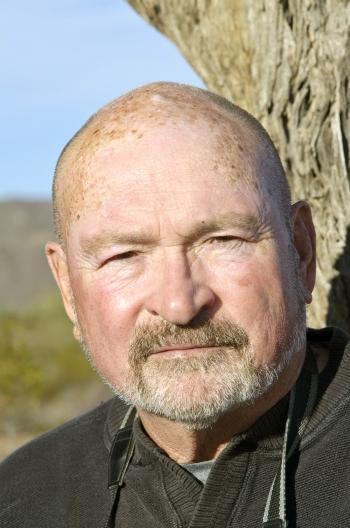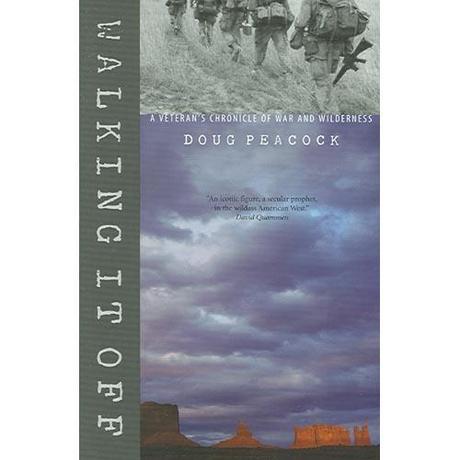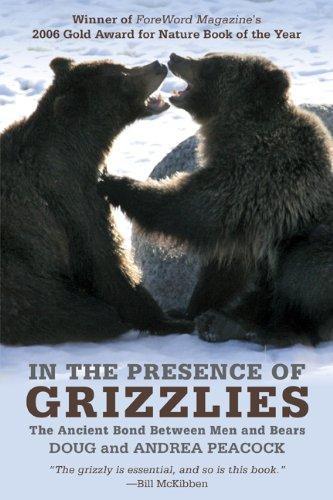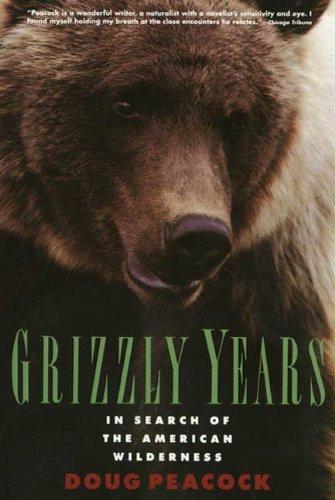Renegade naturalist Doug Peacock on saving ourselves from a bleak future
by Elizabeth Miller / Boulder Weekly
 While the grizzlies near his Montana home hibernate, Doug Peacock retreats to southern Arizona to a town near the Mexican border where he can wander 100 miles before hitting another town. The self-described desert rat honed his wilderness affinities under legendary conservationist Edward Abbey, author of Desert Solitaire, and was the inspiration for George Hayduke, the eco-saboteur central to the The Monkey Wrench Gang. For anyone who’s ever wanted to take a chainsaw to a billboard or watch a dam implode so a river can run free again, Peacock and Abbey have long been totems.
While the grizzlies near his Montana home hibernate, Doug Peacock retreats to southern Arizona to a town near the Mexican border where he can wander 100 miles before hitting another town. The self-described desert rat honed his wilderness affinities under legendary conservationist Edward Abbey, author of Desert Solitaire, and was the inspiration for George Hayduke, the eco-saboteur central to the The Monkey Wrench Gang. For anyone who’s ever wanted to take a chainsaw to a billboard or watch a dam implode so a river can run free again, Peacock and Abbey have long been totems.
Abbey was always a proponent of saving wilderness areas — half a century ago, he was saying we didn’t have enough wilderness lands in the U.S., and now we have even fewer.
“At the end of the last book, In the Shadow of the Sabertooth, I end up with Ed Abbey because of a promise I made to him from 15 years ago — and the fact that he was dead does not relieve me of that obligation,” Peacock says. “Thirty-some years ago, he came to the conclusion that the only thing worth saving was wilderness, and he also said that it is always a patriot’s duty to be prepared to defend his country from its government, and I take those things to heart and I’m very loyal to Ed. I do a lot of introductions for his books and forewards to Desert Solitaire and things like that. I’m not just an old friend who loved him and buried him, I’m also a great admirer of his work and the value of his words, and I try to keep that a living legacy.”
When Abbey died, Peacock rolled him up in a sleeping bag and buried him in an undisclosed location in the desert near Mexico. While he’s in New Mexico, Peacock says, he visits Abbey’s grave.
“I go out and sit there and take a Mexican beer and drink half and pour the other half on the grave and have a conversation with the rocks,” Peacock says.
This winter, Peacock was also taking his yellow notepads and a chair into desert washes and writing with the pad on his lap. That’s where he finished his latest book, In the Shadow of the Sabertooth: A Renegade Naturalist Considers Global Warming, the First Americans and the Terrible Beasts of the Pleistocene, after a five-year effort that took him through thousands of pages of research papers.
“I’m used to writing memoirs, where you just scratch it off and you don’t worry about a lot of important facts getting in the way of a good story,” Peacock says. “If you can’t remember if it happened last year or the year before, it doesn’t matter. You can’t tell whoppers. But you can’t even tell a little lie in this book. You’ve got to get everything right. I’m a natural born liar and those memoirs came a lot easier.”

In addition to research on grizzlies, Peacock write a memoir on returning to the wilderness after serving in Vietnam.
His earlier books included Grizzly Years, one of several books produced in the decades he’s spent researching grizzlies, and Walking It Off, a memoir on how the wilderness helped him recover after his time in Vietnam as a Green Beret medic.
This latest book, In the Shadow of the Sabertooth, looks at the specter of global warming and what we, as humans, may have to do to adapt to a warming planet based on the changes suffered by homo sapiens during the last period of global warming, about 15,000 years ago.
“It’s just a bummer story,” he says of the outlook on climate change today, “but I didn’t want to write a bummer book, so I wrote about when global warming happened once before to homo sapiens — that’s about 15,000 years ago right here in North America. I’m not expecting it to draw a lot of solid parallels between the two periods of global warming. The one we’re in today is much, much worse, but it was more a parable of global warming, and what really interested me was how human beings perceive threat or peril and how they adapt to change. And so I spent a lot of time writing about the old story and the reason is, the modern story, it doesn’t look good.”
In the coming decades, he says, we could see areas of the world no longer able to support agriculture. Climate change may dramatically affect the lives of the next generation, he says, and he notices that when he talks to younger audiences, he pulls his punches slightly.


The solution 15,000 years ago was to migrate, but with 7 billion people on the planet, he says, that isn’t an option.
“The prognosis is bleak and it looks very painful and very deadly to all species of animals, not excepting the two-legged variety,” he says.
The inspiration for his work starts just behind his home about 30 miles north of Yellowstone Park, where warmer winters have allowed for an explosion in the white bark pine beetle population in the past six years. The mountain ranges have turned from green to red in beetle kill — and pine nuts are the single most important food for Yellowstone-area grizzlies he’s studied for decades, he says. “I’ve been saying for 40 years the fates of men and bears are mingled — and not quite flippantly, either,” Peacock says. “So that was a big red flag for me.”
The bears he’s spent most of four decades studying, grizzlies, will have few places to go — and though the species has been extirpated in Colorado since 1979, with rumored sightings as recent as 2006 and promising evidence from a study Peacock himself led in the ’90s, Colorado’s high mountains may provide some of the better remaining habitat for grizzlies, or wolverines and wolves, which are also extirpated in Colorado.
“The bottom line is human tolerance,” he says. “Humans got to quit killing those animals, and that’s why they never get very far. One agency or another or just individuals shoot them out of fear, ignorance, hatred. It’s really beyond irrational, at least it is up here.”
Those animals need to be around just like wilderness areas need to be around, he says, as a necessary part of our human psychology.
“All our evolution has taken place in essentially a single habitat whose remnants today we call wilderness,” he says. “We didn’t evolve in villages or with farming. We evolved as hunters and gatherers foraging out on wild lands that still survive today. … I think it’s just a good strategy to keep good-sized chunks of that original habitat around just as a safety valve for reasons we don’t even know yet.”
Peacock’s love affair with the wilderness started in Colorado in 1964, working solo on a geology thesis on the western side of the Sangre de Cristos. He didn’t see another human being all summer long, he says.
Then, he shipped out to the jungles of Vietnam as a Green Beret medic and dealt with the death and destruction of what he calls a bad war, an unnecessary war. He returned just as the snow was melting in the Rocky Mountains, and a malaria attack drove him to Yellowstone.
“I came back and I was like a wounded animal, like thousands of other vets, and I couldn’t talk to anybody, and I went where I was most comfortable, which was wilderness, and eventually I ran into grizzlies. They really got me out of myself like nothing else could,” he says. “That’s kind of an ageless formula. It doesn’t matter if it’s Iraq or Afghanistan or Vietnam. The healing power of wild country and wild animals, it’s just a powerful, timeless formula for mending. Not that you mend all the way, because you never do.”
He still has hair trigger reactions, he says, but spending time in grizzly country made him take a look at himself in a way that created an enforced humility and forced him to pay attention to something outside his life — or risk losing that life to a bear.
“One thing that you really need to be able to do is look inwards and look in at your life, and that’s very hard sometimes, you’re so wrapped up in yourself,” he says. “The one place where self indulgence is utterly impossible is grizzly country because there’s something out there that’s big, and if it chooses it can kill and eat your ass.”
As he learned his way around grizzlies, there were a few close calls. He’s been charged by bears multiple times. His response — the only safe response, he says — has been to stand his ground without screaming, running or trying to climb a tree to get away.
“I don’t move a muscle, literally, I don’t blink an eye. I’ll talk softly,” he says. The bears charge, and then veer off at the last moment. “One mother actually skidded to a stop within a few feet of me and reached forward and sort of sniffed my pant leg, then turned around and ran away.”
His approach now is to travel quietly unless he thinks he runs the risk of surprising a bear, particularly one napping, then he’ll make noise — cough, or sing softly.
“I used to say, you know, it’s OK, you can sing softly, but whatever you do, never sing country western,” he says, and laughs. “I don’t know, I might have been joking, but maybe not. I just haven’t tested — I don’t have the data yet.”
That he met Edward Abbey right about the time he came back from Vietnam was no accident either, he says. He returned from war and saw the Rocky Mountains he turned to for refuge being chewed up by mines, clear cutting and development as the destruction of a homeland. It’s a battle now to save what’s left of them.
“I tended to regard defense of that homeland very militantly. I still do,” he says. “I think it’s that important. I think if we lose these places, I think we’ve lost ourselves, not just our souls but I think we’ll lose our physical existence on earth. It’s that important and I will fight it like a war. It’s the most important thing I do. It’s a cause I’d die for.”
Climate change should be the main focus for environmental activists now. Among the conclusions he reaches in his new book, he says, is “in lieu of other action, maybe the best thing you can do to fight for a future for yourself and your kind and the creatures around you is fight for wilderness. Fight for saving wild habitats in any size or form. Anything that smells like wilderness is close enough.”
Doug Peacock: Grizzlies, Wilderness and War, a talk and book signing, will take place at 7 p.m. Thursday, June 13, at Chautauqua Auditorium, 900 Baseline Road. Tickets are $14 and are available at www.chautauqua.com.
Respond: [email protected]

